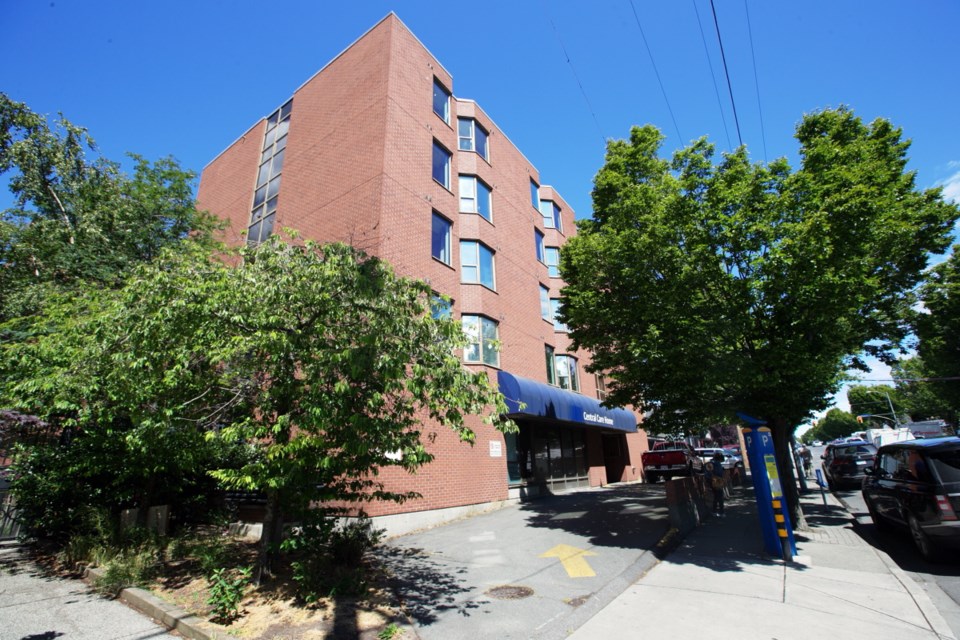The B.C. government has bought the former Central Care Home in Victoria to house homeless people who are camped on the courthouse lawn.
The province announced Wednesday that it had paid $11.2 million to the Baptist Housing Society for the building at 844 Johnson St.
The building will provide 140 units of long-term supportive housing for people, including those with mental-health and addictions issues.
Housing Minister Rich Coleman said the province has a deal on a second property that will provide an additional 50 units. He declined to identify the building.
Coleman said the province will work with the care home’s neighbours to address concerns, but said that officials have found that homeless people stabilize once they are provided housing, meals and help dealing with their issues.
“We, as a society, have always tried to be there for vulnerable populations,” Coleman said. “Our success with these folks, when we add in stable housing with supports, is usually very good, and I wouldn’t expect that would be any different in this case.”
Vancouver-based Portland Housing Society will manage the new home because of its experience working with disadvantaged people, Coleman said. The society already has staff working at the tent city outside the Victoria courthouse, at Quadra Street and Burdett Avenue.
The government said renovations, including painting and flooring replacements, will begin immediately. Tenants should be able to move into the building in late July, and Coleman expressed hope that the estimated 90 campers at tent city will leave once housing is available.
Failing that, however, the government will go back to court to seek an injunction to evict them. The government intends to argue that the camp has become more unsafe since April, when another injunction attempt failed.
B.C. Fire Commissioner Gordon Anderson has ordered the province to dismantle the tent city by June 23 in light of growing safety concerns. Anderson said tent city residents are either unable or unwilling to fix the fire hazards at the site.
“Due to these circumstances, the order has been issued as it is clear there is no likelihood of the premises being brought into compliance and the risk to life safety resulting from the conditions is unacceptable,” he stated in a letter to the province on Monday.
Coleman said the province is reviewing its options given the commissioner’s order and the upcoming injunction hearing.
“Either way, we know the conditions are unsafe at that site,” he said.
Residents at the tent city said they’ve worked to comply with the order with no help or resources from officials.
“If they used their resources to help us instead of pitting against us, we could do this,” said tent city resident Ana McBee.
A large blue garbage bin sits outside and signs are posted with fire safety guidelines. Fire extinguishers have been placed throughout tent city and orange paint outlines the ordered corridors. Propane and camp fires have been banned.
McBee said some demands placed on residents have been impractical.
For example, she said, “the pathway size went from three feet at first to now 10 feet. We can’t change that now. We can’t lift up someone’s home and move it.”
The fire order states a one-metre pathway is required around each tent, which does not exist, and that the egress pathways are not adequate.
McBee said residents have used candles for light because there is only one electrical outlet for 100 people to charge flashlights.
Resident Bert Woldring said people in tent city are aware of the fire risk. “We are trying to clean up and comply to an impossible situation.”
McBee said pressures from provincial court actions, fire safety orders and police patrols have prevented tent city residents from making plans. These include a needs survey with University of Victoria researchers and the formation of a society to look at creating an intentional tent city or micro-housing project.
She said she is skeptical about the government’s housing plans for tent city residents because none have been consulted.
“If you don’t consult people about their needs, it is not going to be a successful fit,” McBee said. “A lot of us are not accepted into these environments and they’ve been traumatic.”
Jane Butler McGregor of the Victoria Conservatory of Music said she was surprised and disappointed to hear about the plan for the Central Care Home, which is half a block from the school and concert hall. Also nearby is the homeless service provider Our Place.
“I just don’t understand why we weren’t consulted,” said Butler McGregor, noting the conservatory is a school for 4,500 students.
She said the conservatory pays $48,000 a year in security costs related to Our Place. The front entrance was moved from Pandora Avenue to Johnson Street a few years ago because of security concerns.
“This whole block bears the brunt of social services,” she said.
With the new housing building opening a few doors down Johnson Street, Butler McGregor said she will go after the municipal and provincial governments for any additional costs to the conservatory.
“I am going to make a fuss. They can pay for increased security,” she said.
Victoria Mayor Lisa Helps welcomed the news, but acknowledged that the project might face push back.
“I think it depends on the operating model,” she said, noting that there was resistance to the My Place transition home at the former Boys and Girls Club at 1240 Yates St.
“I think if you have the service provider, Portland Housing Society, and enough health-care resources, I think it will be fine.”



